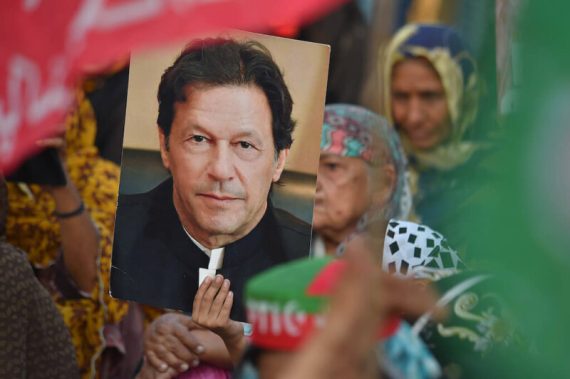I
t was 1997, and the first elections that Imran Khan’s Pakistan Tehreek-e-Insaf (Movement for Justice, PTI) had contested. The party’s candidate secured about 19 votes from the polling station in an area of a small town in Punjab, Sadiqabad. That was an apt reflection of his position in national politics as well, where his PTI couldn’t secure a single seat. His detractors were proven right: the delusions of grandeur that followed the cricket World Cup of 1992, where Khan had led his team, had got the best of him. He was shrugged off as being irrelevant by Benazir Bhutto’s Pakistan People’s Party (PPP) and Nawaz Sharif’s Pakistan Muslim League (PMLN), the two major parties at the time.
In the 2000s, during General Musharraf’s military rule, Khan remained in opposition, albeit with only one seat that he was able to win in the 2002 elections. The PTI boycotted the following elections, held in 2008, alleging the system was rigged in favor of the corrupt.
But Khan’s party began to gather steam in the years preceding the 2013 elections and surprisingly came forth as the second-biggest party by popular vote in the 2013 elections, securing 35 seats in the lower house of parliament, the National Assembly. With just one seat in the 2002 and zero seats in the 2008 elections, this rise to 35 seats was phenomenal.
Then came the elections of 2018, in which the PTI secured 149 seats, leaving the PMLN trailing behind at 82. But the party was still short of the coveted number of 172 needed to form a government. It was left with no option but to invite smaller parties to a coalition to be led by the PTI. In any case, Imran Khan—long played down for his poor political acumen and irrelevance in national politics—had finally risen to become the prime minister of Pakistan within about two decades of entering politics.
Pakistan under Khan
Imran Khan had won elections on the promise of a “Naya Pakistan” (New Pakistan), an Islamic welfare state. He refashioned and expanded the existing Benazir Income Support Programme into the state-of-the-art Ehsaas cash transfers program for the poor, opened soup kitchens and shelters for the poor, and introduced fully state-sponsored health insurance in two provinces that were governed by the PTI, making treatment at government and many private hospitals free for over two-thirds of the population of the world’s fifth most populous country.
This was in addition to the other measures taken to give voice to the common person, such as the Citizen’s Portal, where any citizen could lodge a complaint online for any issues they faced in public services, and various other digitization initiatives for smooth provision of public services and reduction in red tape.
Even with COVID19 wreaking havoc across the world, Khan’s government performed decently in containing the pandemic and its economic fallout. Pakistan did not suffer the catastrophic mortality rates that both its neighboring countries—Iran and India—did, nor did it see a similar dip in its GDP. Moreover, the expansion of the social safety nets helped cushion the poor to muddle through the crisis.
Still, it was not all sunshine and roses. The government’s economic management left much to be desired. The IMF program kept getting interrupted—and prolonged—because of slippages in meeting targets, and policy inconsistency and uncertainty remained a problem throughout Khan’s time in office. Meanwhile in Khan’s almost four years in office, inflation was roughly double what it had been in the preceding four years.
Khan, the establishment, and a new-found camaraderie
Khan was quite popular when he assumed the premiership. However, he owed at least a share of that popularity to the tacit support of the powerful Pakistani military establishment. In fact, Khan’s rivals accused the momentous rally he held on October 30, 2011, which set up the tone for the PTI’s successful 2013 election campaign that saw its rise to second-largest party by popular vote, as having been sponsored by the military establishment.
Later, in 2018, when the PTI was short of the magic number of 172 seats to form a government, it was the establishment-leaning parties, such as the Pakistan Muslim League (PMLQ), the Balochistan Awami Party (BAP), and the Muttahida Qaumi Movement – Pakistan (MQM), which joined the PTI-led coalition, enabling Khan to become premier. But even before that, in the run-up to the 2018 elections, many candidates had warmed up to the PTI primarily because it was seen as the King’s (establishment) party.
Khan provided a fresh alternative to the establishment. He was clean, driven, and was ready to work under its auspices. General Bajwa, the military chief at the time, developed a good understanding with Khan and helped habilitate his government in both the domestic and international contexts. This helped the PTI-led coalition, as Khan’s party was mostly made of new politicians and was seen as inexperienced. In no time, Khan developed a warm relationship with the Arab Gulf states too—especially, Crown Prince Muhammad bin Salman (MBS).
Countries like Saudi Arabia, the UAE, and Qatar had the international clout needed to bolster Pakistan’s position internationally, which helped break the ice with the U.S. Trump-led administration. At the same time, the influence of these regional heavyweights, which historically were practically lenders-of-the-last-resort to Pakistan, significantly eased things for Khan domestically as well.
The disillusionment
Yet, for someone like Khan, known for being headstrong throughout his life, working under the establishment’s influence was not an option. As the honeymoon period of his government neared its end, he started asserting his will. Khan wanted full control of his government, a relentless crackdown on corruption, and autonomy in devising foreign policy—as the PTI’s manifesto had promised.
Being the gung-ho type that he is, Khan was looking to make waves with radical changes in all spheres. General Bajwa, being relatively temperate, preferred stability and a continuation of the status quo, of which he was himself a part. For him, Khan was somewhat of a loose cannon.
Clearly, Khan was not cut out for the tightrope he was having to tread, and eventually, things fell apart.
Khan’s fall
As Khan diverged from Pakistan’s long-standing positions on various facets of foreign policy, his problems grew beyond Pakistan’s borders to ruffle feathers globally. His warming up to Turkey and Malaysia, and the idea of a new Islamic bloc besides the Organization of Islamic Conference (OIC) was not received well in Saudi Arabia; his flat rejection of the recognition of Israel irked the regional powers which had already yielded to its growing influence.
Khan’s tilt towards Russia and China, and the denial of air bases to the United States, which was looking to maintain a presence in the region after the withdrawal from Afghanistan, angered the Biden administration. His strong exception to the letter by European countries’ ambassadors insisting on condemning the Russian onslaught on Ukraine irritated Europe. The U.S. was not ready to hear an “Absolutely no” to a question about bases, and European countries were not ready for rhetoric of the sort “Are we your slaves?”
Recommended
The establishment—both local and global—had had enough. A vote of no confidence was called, and the PTI’s coalition partners spontaneously pulled back their support en bloc, amidst cries of foul play from Khan. The two major rival parties—the PMLN and the PPP—which had been each other’s fierce opponents for the last three decades, united under the banner of the new Pakistan Democratic Movement (PDM), attracting small parties that had deserted Khan in favor of the new coalition.
The establishment’s new pick, Shahbaz Sharif, became Pakistan’s prime minister, in the country’s first-ever in-house change of PM brought about by a vote of no confidence.
Shahbaz Sharif’s government
In sharp contrast to the intransigent Khan, Sharif is diplomatic and much easier to work with for the Pakistani establishment. Since taking the reins, he has been able to mend relations with the U.S. and the Gulf countries. At the same time, thanks to the warm ties of the Sharif family with President Erdoğan, he has been able to maintain a good relationship with Turkey.
But on the domestic front, the new government has been rudderless. Standing at 35%, inflation has reached a 50-year high, in a country where one out of three people live in poverty, GDP growth has plunged to almost zero, law and order is abysmal, and there seem to be no civil liberties anymore. The cash-strapped country is staring at the prospect of default, with industries shutting down, and the rupee in a virtual free fall.
But this hasn’t concerned the government much, whose sole focus, at least domestically, has been to control Khan’s rising popularity. Khan has been booked in more than 100 cases, including many on grounds of terrorism. The frustrated Home Minister Rana Sana Ullah, to whom the federal law enforcement agencies report and whom Khan accused of being involved in an assassination attempt against him in November, declared, “Either Imran Khan exists, or we do” in an interview about two weeks ago.
To Khan or not to Khan
The situation in Pakistan is dire. Every other day, there is news of a suicide because of the cost of living, or injuries and deaths in stampedes amidst the distribution of food. People are desperate for a solution and looking forward to elections in the hope that a party with a publicly won mandate may be able to restore stability.
But Khan is leading all opinion polls. The home minister recently declared that the government is ready to stop Khan even by unconstitutional means. That is manifest in the government’s avoidance of elections on the pretext of the precarious economic situation and a rising threat from terrorism. It has already announced that circumstances don’t permit elections at the constitutionally mandated time.
On balance, Khan’s government was not known for competence. But the chaos that ensued following his removal from office, the plunge into economic tailspin and the blatant disregard for basic human rights by the new setup, have all but vindicated him, raising Imran Khan to a legend-like status. The people who were frustrated only a year ago, now look back to his times wishfully.





